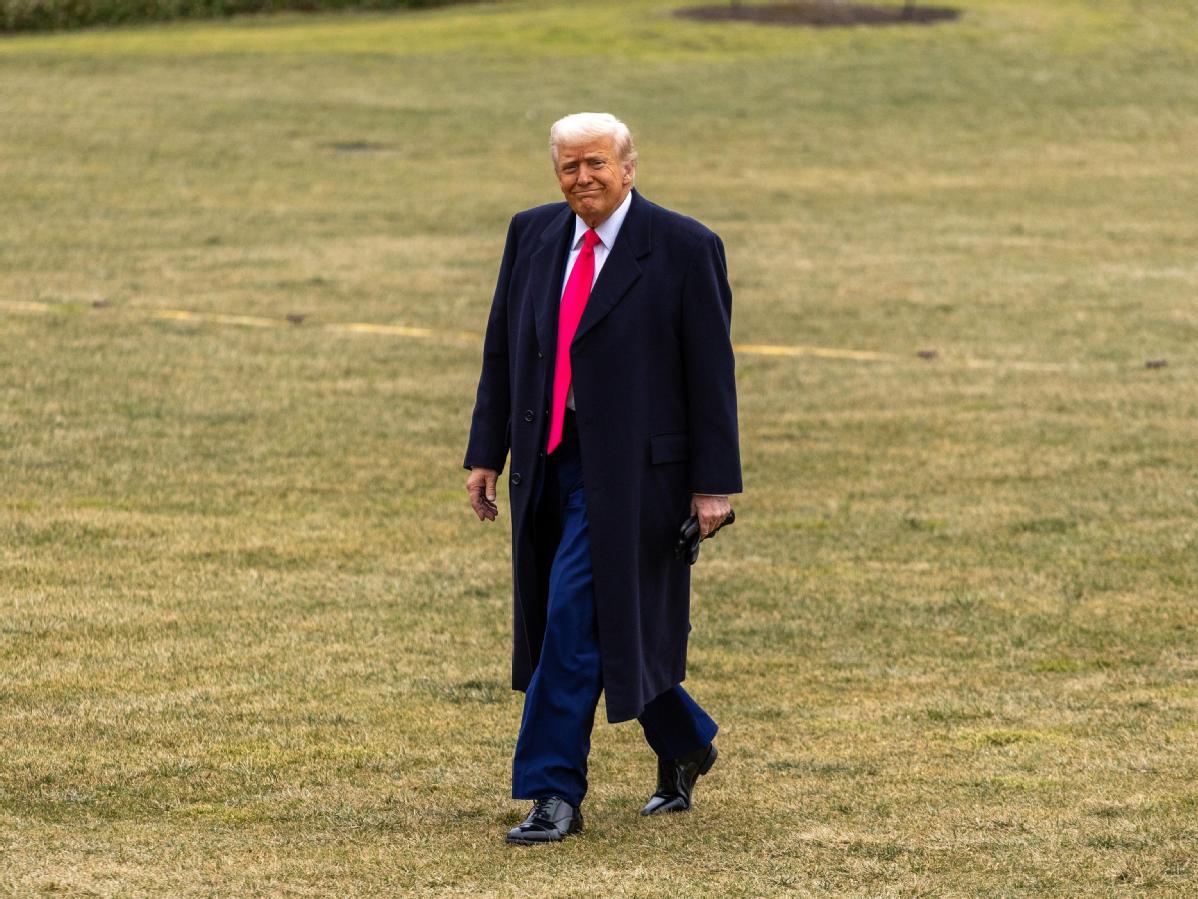
US President Donald Trump returns to the White House via Marine One in Washington, DC, the United States, Feb 22, 2025. [Photo/Xinhua]
With a firm belief in tariffs being "the greatest thing ever invented", the levy-happy US President Donald Trump has undoubtedly made almost all his foreign leader guests over the past month or so have their respective bite of the saying "One man's meat is another man's poison".
Despite what Trump once called "unbreakable" relations between the United States and France, as well as those between himself and Emmanuel Macron, the visiting French president has not been exempted his share of that Trump treat in the face of what he called the "game-changer's" staunch stance on weaponizing tariffs to ensure "America first".
The Trump administration has pledged sweeping tariffs targeting the European Union, raising wide concerns among its EU allies. Were it not for the more pressing Ukraine crisis, the tariff disputes would have been top of the agenda for the meeting between the French and US leaders in Washington.
It was against this backdrop that the French president said in his interview with US media on Monday that the US' priority is its tariffs on China and warned, "Come on. You cannot have a trade war with China and Europe at the same time" insinuating the EU was being wrongly treated.
Yet in a move to show his tariff threats are real, Trump said during their joint news conference at the White House on Monday that sweeping US tariffs on imports from Canada and Mexico "will go forward" when a monthlong hold on their implementation expires next week.
Since Trump reiterated his plan to impose so-called reciprocal tariffs in the presence of his French guest, be it Macron or any other leader from the countries and regions targeted by the US' tariff war, they should be awakened to the fact that the US won't bite their China-baited hooks until the Trump administration extorts what it wants from them.
So it is ridiculous that some US pundits have tried to comfort the US allies and partners by claiming that China is the real target, not them. For instance, Kate Kalutkiewicz, who was senior director for international trade policy at the National Economic Council during Trump's first term, told the Canadian Broadcasting Corp on Monday, the tariffs Trump has threatened to levy on Canada and Mexico "almost entirely relate to China, and China's nonmarket policies and practices which have enabled this global glut".
The former trade adviser for Trump even admitted that Trump's goal of imposing "maximum pain" on Canada and Mexico is to ensure that the US gets the best deal, indicating he is not happy with the trade pact between the US, Mexico and Canada, which was renegotiated during the first Trump administration and made law in 2020. The short shelf life of such trade deals with the US means weaponizing tariffs to reduce the trade deficit or secure a new deal more favorable to the US is a normalized practice of the incumbent US administration.
But it should be reminded, the US has no longer maintained trade balance since the 1970s as an important economic principle, and that its trade deficit is deliberately created by itself, so the tariff war is a false move from day one.
It is no exaggeration to say that the trade deficit is an indispensable part of the US economy, ensuring its capital closed-loop can continuously reap increasing development dividends from the rest of the world. It is through the dollar-dominated trade settlement and trade deficit that the US dollar circulates around the world. The US then absorbs surplus dollars from various countries by issuing Treasury bonds, thereby filling the trade deficit under the current account. The US thus obtains low-cost financing, and then uses this foreign capital to invest abroad to make capital gains.
The only reason why the US administration still obstinately weaponizes tariffs is that it cannot figure out any better approach that can pull the nerve of the world with the lowest input while effectively distracting domestic attention from the US' real challenges at home, which include belated institutional reforms, widening political and social divides, and rising debts.
No matter how "beautiful" the US leader tries to convince his domestic audience his tariffs are, they are still a tax that must be paid by the US public. There are no winners in any tariff war, there won't be this time either.